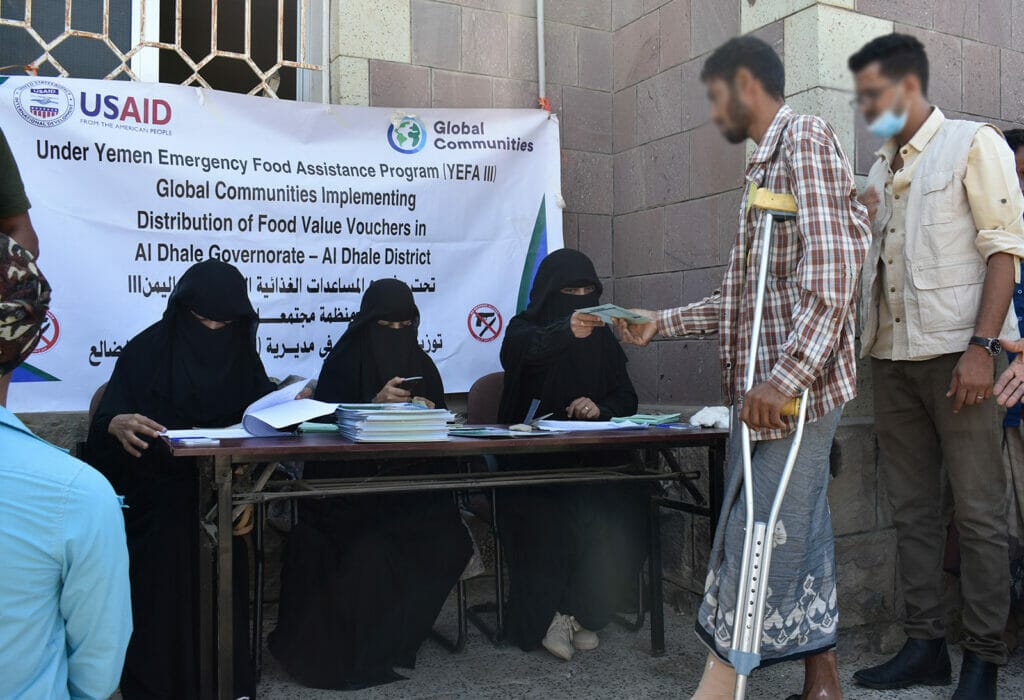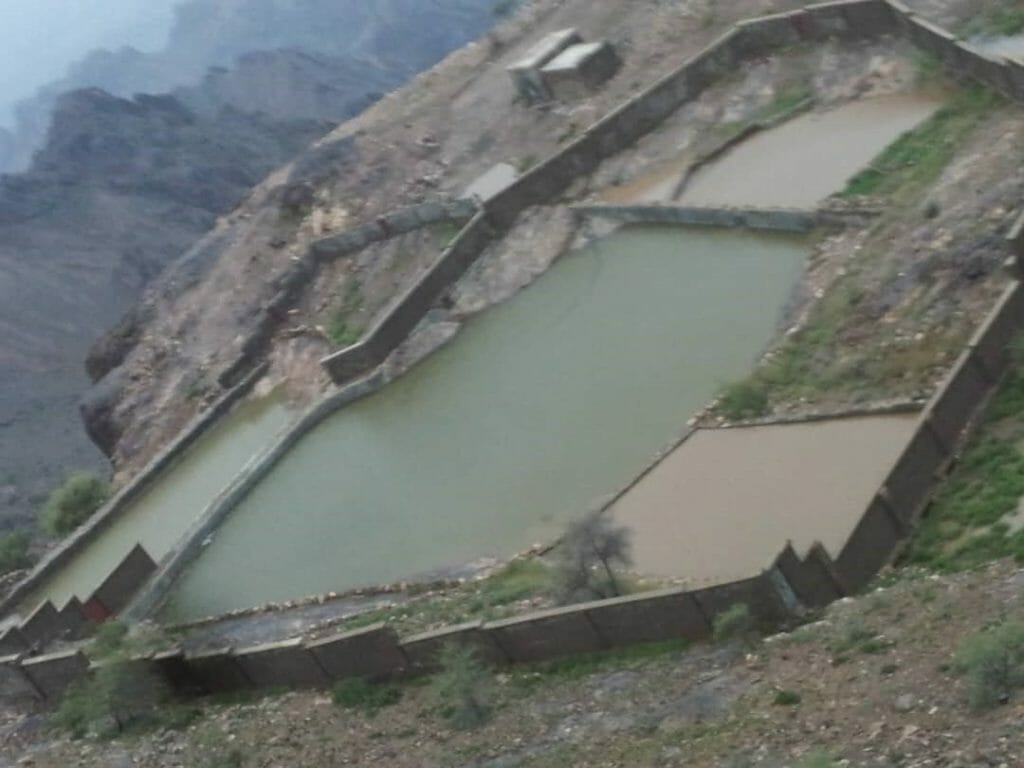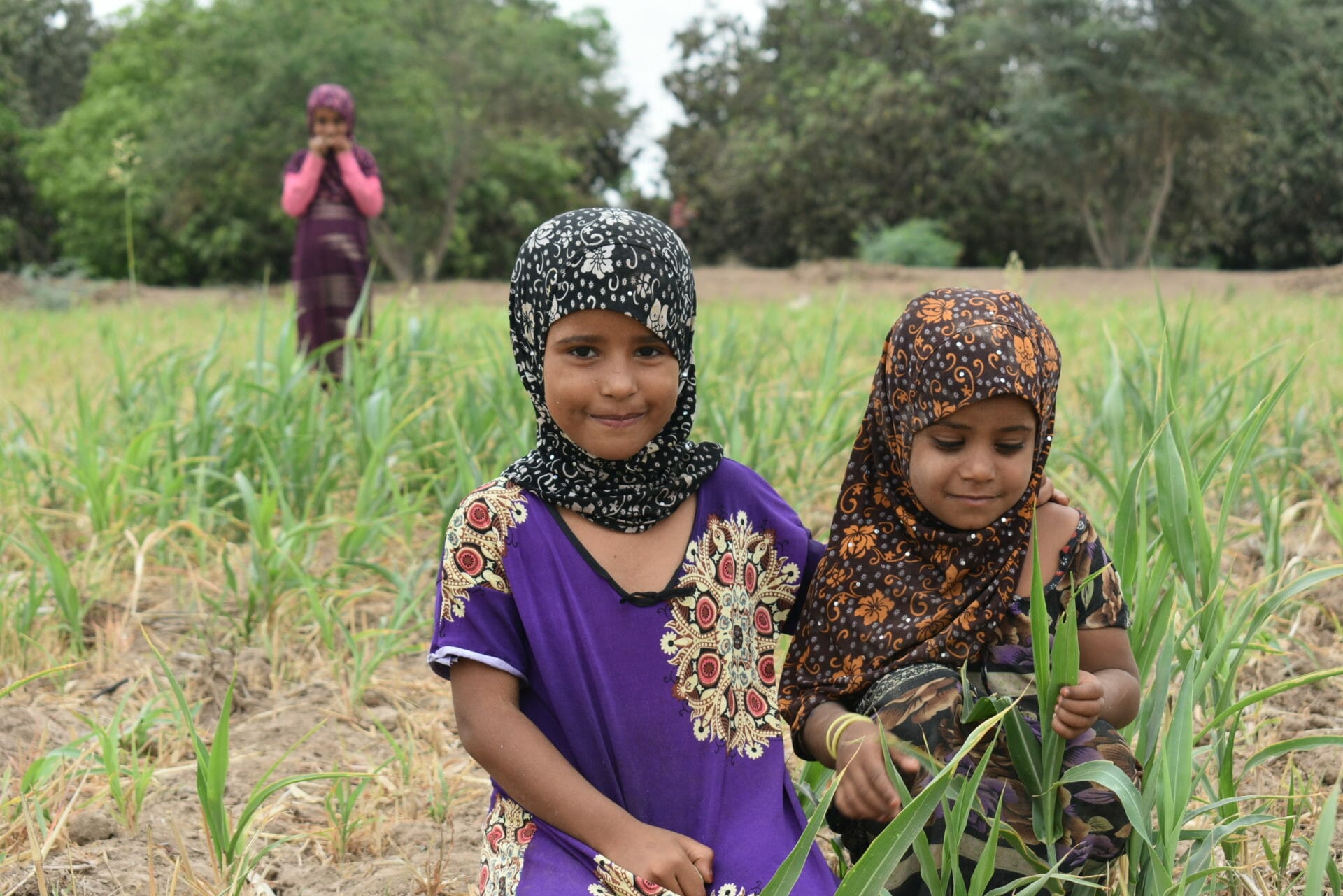Global Communities has been working in Yemen since 2004, implementing humanitarian and development programs across a broad range of sectors and providing on-the-ground assistance throughout the current conflict.
Programs have included providing emergency aid to vulnerable communities affected by intermittent conflicts, empowering young people through job skills development, improving the educational system by rehabilitating schools and providing teaching tools, as well as building the capacity of media and civil society to address and engage the public around social issues related to the rights of women and children.
Over the past eight years, Global Communities has responded to humanitarian needs through the distribution of food and non-food items.
We have also promoted early recovery through the distribution of livestock and agricultural inputs to rebuild assets and improve food security, increase access to water and sanitation infrastructure, improve good hygiene practices, and enhance household incomes by providing marketable vocational skills and establishing asset building groups.
Resolving Conflicts and Reinforcing Social Cohesion in Yemen
Through the USAID-funded Yemen Communities Stronger Together (YCST) program, Global Communities is supporting local initiatives that mitigate conflict, strengthen social cohesion, promote the peaceful resolution of differences, and, where possible, capitalize on stabilization opportunities in the Yemeni governorates of Abyan, Aden, Lahj and Taiz. To that end, YCST implemented 20 medium to large service delivery projects in 16 communities targeted under Phase 1 in the four governorates. The projects were in the sectors of education, water and sanitation, local municipality services and electricity. YCST manages a peacebuilding grants fund to support non-governmental and civil society organizations to implement projects that address broadly-held priorities such as increasing women’s participation in peacebuilding, and forming youth networks to support positive engagement in civic life. Global Communities implements YCST together with Yemeni partner, Field Medical Foundation, and specialized international partners Build Up and Partners for Good. The program runs from August 2018 to May 2022.
59,000
Internally displaced people, 8,417 of the most vulnerable communities and 4,297 vulnerable households in south Yemen received lifesaving food aid over three years, through the end of 2020
1,100
Households received health education and hygiene kits containing soap, toothbrushes and toothpaste, menstrual health products, towels and other basic necessities
8,490
People in Abyan and Lajh Governorates supplied with clean, safe water through two water enhancement projects
Recent Programs
Emergency Support for Food Security and Livelihoods Restoration
Global Communities designed the Integrated Modalities to Promote Agricultural, Cash-for-Work, and Training in Yemen II (IMPACT II) program to address the urgent multi-sector humanitarian needs of 21,742 vulnerable, conflict-affected Yemenis in Aden, Lahj and Al Dhale’e governorates. From July 2020-June 2021, with funding from USAID’s Office of Foreign Disaster Assistance (USAID/OFDA), IMPACT II aimed to improve household food security and livelihoods by restocking critical agricultural inputs, including seeds, tools, fodder and livestock. In addition, the program focused on increasing household income in vulnerable households through market-driven vocational training, cash-for-work opportunities, and by supporting asset building groups and livelihoods restoration. Activities also improved access to safe water supplies and hygiene knowledge and practices in targeted communities.
Delivering Lifesaving Food Assistance to Host Communities
Global Communities implemented the $5 million, 18-month Yemen Emergency Food Assistance (YEFA) program funded by USAID’s Office of Food for Peace (FFP) from October 2018 to March 2020. The goal of YEFA was to deliver lifesaving food assistance to more than 3,000 of the most vulnerable host communities and internally displaced people and households (more than 23,000 individuals) through market-based interventions using food vouchers. YEFA is a component of a larger strategy that seeks to align Global Communities activities with the Integrated Response for Famine Risk Reduction and maximize the overall impact of our programming by leveraging OFDA and FFP support in our proposed joint areas of operation with the highest risk of famine. YEFA enabled Global Communities to reach the most vulnerable individuals in targeted locations to ensure that all segments of communities reaped the benefits of food security, WASH and livelihoods programming.
Delivering Lifesaving Food Assistance to Host Communities
Global Communities implemented the $5 million, 18-month Yemen Emergency Food Assistance (YEFA) program funded by USAID’s Office of Food for Peace (FFP) from October 2018 to March 2020. The goal of YEFA was to deliver lifesaving food assistance to more than 3,000 of the most vulnerable host communities and internally displaced people and households (more than 23,000 individuals) through market-based interventions using food vouchers. YEFA is a component of a larger strategy that seeks to align Global Communities activities with the Integrated Response for Famine Risk Reduction and maximize the overall impact of our programming by leveraging OFDA and FFP support in our proposed joint areas of operation with the highest risk of famine. YEFA enabled Global Communities to reach the most vulnerable individuals in targeted locations to ensure that all segments of communities reaped the benefits of food security, WASH and livelihoods programming.
Rehabilitating Yemen through Cash-For-Work Projects and Improved Community Hygiene
From October 2017-May 2019, Global Communities implemented the $6.8 million Continued Recovery, Emergency Assistance, and Training Engagement in Yemen (CREATE Yemen) program. Funded by the U.S. Agency for International Development’s Office of U.S. Foreign Disaster Assistance (USAID/OFDA), the goal of CREATE Yemen was to meet the humanitarian assistance and early recovery needs of more than 23,500 conflict-affected households through a holistic approach to bolstering food security and livelihoods, improving WASH outcomes, and promoting economic opportunities in Aden, Lahj and Al Dhale’e governorates in southern Yemen. CREATE Yemen provided agricultural inputs (farm tools and seeds) to 350 farmers, three goats each to 1,000 households, and six weeks of intensive training to 65 community animal health workers. Several projects were designed to help vulnerable households generate more income through market-driven vocational training for 225 youth, support for 25 all-female asset building groups, and cash-for-work opportunities for 1,800 individuals. These cash-for-work projects were used to rehabilitate schools and water supply systems. Community hygiene improved by way of training 4,500 adults and 9,600 students on critical WASH topics such as cholera prevention, water storage and treatment, water conservation, latrine use and handwashing, and sanitation and waste management.
Bolstering Food Security, Livelihoods and Economic Opportunity
From September 2016-October 2017, the Yemen Early Recovery Support (YERS) program focused on delivering humanitarian assistance and early recovery activities for vulnerable and conflict-affected populations in southern Yemen. Funded by USAID/OFDA, the program bolstered food security and livelihoods, improved WASH outcomes and promoted economic opportunity. YERS operated in five districts in Aden and Lahj Governorates and included the distribution of livestock, provision of market-driven vocational trainings, WASH trainings and establishment of asset building groups implemented through local partnerships to ensure community ownership and promote sustainability.
Improving Learning Environments in Yemen
The Community Livelihoods Program, funded by USAID, aimed to improve the quality of basic education, boost academic performance and increase the retention of students, especially girls. To accomplish this, Global Communities provided teaching aids kits to more than 500 schools, as well as training and follow-up support to teachers on how to use the resources in the kits. Global Communities also helped to set up school libraries and resource rooms and assisted with small-scale infrastructure improvements (such as latrines) to improve the learning environment.
Addressing Malnutrition with Emergency Food Assistance and Nutrition Interventions
Global Communities designed the 11-month Yemen Emergency Food Assistance (YEFA) III program to save and improve lives in targeted areas of Al Dhale’e, Al Azariq and Qa’atabah districts in Al Dhale’e governorate. From July 2020-June 2021, with funding from USAID’s Bureau for Humanitarian Assistance (USAID/BHA), YEFA III increased food security, improved dietary diversity and reduced acute malnutrition for an estimated 29,050 Yemenis through emergency food assistance and support for nutrition and hygiene interventions. This program was designed based on lessons learned from previous iterations that commenced in 2018. In line with Global Communities’ approach to emergency response, the YEFA programming started in 2018 with a focus on the distribution of food baskets to vulnerable households. The program then evolved and expanded to integrate nutrition sessions for targeted households to address widespread malnutrition issues. YEFA III expanded further in scope to provide a referral mechanism for severe acute malnutrition and moderate acute malnutrition. Similarly, acknowledging the relationship between hygiene practices and malnutrition, hygiene promotion activities were intensified during the most recent iteration of the programming.
Meeting Basic Food Needs through Market-Based Interventions
Global Communities’ USAID-funded YEFA II program met the immediate basic food needs of 4,297 Yemeni households (30,079 individuals) living in Aden and Al- Dalhe governorates in southern Yemen through market-based interventions using e-vouchers. From July 2020-June 2021, the program provided 2,741 highly vulnerable households with eight rounds of food vouchers and 1,556 newly displaced households with three months of food vouchers as part of Global Communities’ Rapid Response Mechanism.
Meeting the Early Recovery Needs of Conflict-Affected Populations in Yemen
From October 2018-June 2020, Global Communities implemented the $11 million, 18-month Integrated Modalities to Promote Agricultural, Cash-for-work, and Training in Yemen (IMPACT Yemen) program with the goal of meeting continued humanitarian assistance and early recovery needs of vulnerable and conflict-affected populations in Yemen. To achieve this goal, we employed an integrated, holistic approach to bolstering food security and livelihoods, improving WASH outcomes and promoting economic opportunities. IMPACT’s multi-sectoral approach aimed at addressing the intertwined and underlying factors of the conflict that are creating widespread malnutrition and disease. The program addressed the needs of more than 74,000 vulnerable beneficiaries in Sana’a, Ibb, Taiz, and Dhamar, Aden, Lahj and Al Dhale’e.
Promoting Livelihood Opportunities and Rebuilding Critical Community Infrastructure
From February 2017-September 2018, Global Communities implemented the USAID/OFDA-funded Northern Support to Yemen for Infrastructure, Cash Assistance and Livelihoods (NSYNC Livelihoods) program. The goal of NSYNC Livelihoods was to save lives, alleviate human suffering and reduce the social and economic impact of the crisis on vulnerable Yemeni people in Taiz and Ibb governorates in northern Yemen. NSYNC worked to improve food security and livelihoods for conflict-affected farmers through provision of seeds and farm tools and to boost short-term household incomes through cash-for-work opportunities. The project supported nearly 75,000 vulnerable Yemenis through the rebuilding of critical community infrastructure, and improvement of hygiene awareness and practices for communities where water, sanitation and hygiene (WASH) services have been rehabilitated. In addition, Global Communities provided emergency assistance to more than 22,000 internally displaced people affected by the Hodeidah conflict and more than 2,300 host communities in cholera-affected areas.
Reducing Increasing Rates of Malnutrition
From August 2012-February 2017, with funding from USAID/OFDA, Global Communities implemented the Emergency Assistance to Support Yemeni Communities (EASE) program to reduce increasing rates of malnutrition. This was accomplished by focusing on poor hygiene practices, limited access to potable water and a reduction of purchasing power caused by increasing costs of food. Global Communities worked with local communities to disseminate key hygiene messages in conjunction with increasing access to improved water sources and the distribution of relief items. The program also supported economic recovery activities which sought to immediately increase purchasing power of vulnerable households for displaced populations as well as host communities.
Improving Household Food Security in Yemen
With funding from USAID’s Office of Food for Peace, Global Communities employed an integrated strategy to promote food security among vulnerable households. Yemen Food for Asset Development relied on an integrated strategy involving the use of food aid to vulnerable households, labor-based methods to re-engage actors in their own recovery, and participatory decision-making approaches focused on women, in order to develop productive assets that are owned, managed and maintained by target households and the community. Asset building activities included household and institutional rainwater harvesting, agriculture infrastructure rehabilitation and kitchen gardens. These activities were integrated with behavior change communication training on hygiene and nutrition as well. The program targeted more than 20,000 food insecure households across eight districts in the three governorates of Raymah, Taiz and Ibb.
Our Work in Yemen
Early Recovery & Market Systems
Advancing Market-Based Recovery
Food Security & Agricultural Livelihoods
Promoting Post-Emergency Food Production
Governance
Strengthening Civil Society, Democracy and Responsive Government
Positive Youth Development
Equipping Young People for Leadership and Success
Gender Equality & Social Inclusion
Lifting Marginalized Voices and Investing in Women as Leaders and Men as Allies
Health
Combating Disease, Improving Nutrition, and Ensuring Healthy Mothers, Children and Adolescents
Economic Opportunity
Advancing Job Training and Market Linkages for Sustainable Livelihoods
Resilience
Enhancing Food Security, Sustainable Agriculture and Water Management in Climate-Affected Communities
Protection
Preventing, Mitigating and Responding to Exploitation and Harm
Building Resilience
Innovations to Lay the Foundation for Long-Term Recovery
Sustainable Development
Standing with Communities as They Shape Their Own Future
Food Security & Nutrition
Delivering Food Aid and Promoting Sustainable Livelihoods
Resources
Briefs & Case Studies
Addressing Sanitation Market Challenges
Through the Enhancing Water, Sanitation, and Hygiene (En-WASH) program, USAID Ghana is helping to increase access to sustainable and affordable sanitation in six regions of northern Ghana by identifying solutions to motivate the private sector to work towards closing the service delivery gap.
NEWS
Latest stories from the blog

Pass the Mic: Using Data to Improve and Adapt Emergency Food Assistance Programs
By Paula Rudnicka, Sr. Manager for Public Affairs at Global Communities Using reliable, quality data in humanitarian settings is critical to ensuring that life-saving interventions …
Read More
Challenging Malnutrition When Widespread Hunger Prevails in Yemen
One-year-old Mohammed and his family live in the Qa’atabah district of Yemen, near constant conflict that has killed and injured civilians and impeded access to …
Read More
Solar-Powered Pumping System Brings Clean Water to Community in Yemen
Yemen’s ongoing conflict had pushed the community of Al-Mahfad to undertake extreme measures to deal with water shortage. Residents were given access to water only …
Read More
Establishing Sustainable Access to Safe Water Through Rehabilitation of Water Reservoir
Since 2009, Global Communities has implemented several WASH projects in response to the protracted crisis in Yemen. Global Communities WASH projects included rehabilitation of public …
Read More
